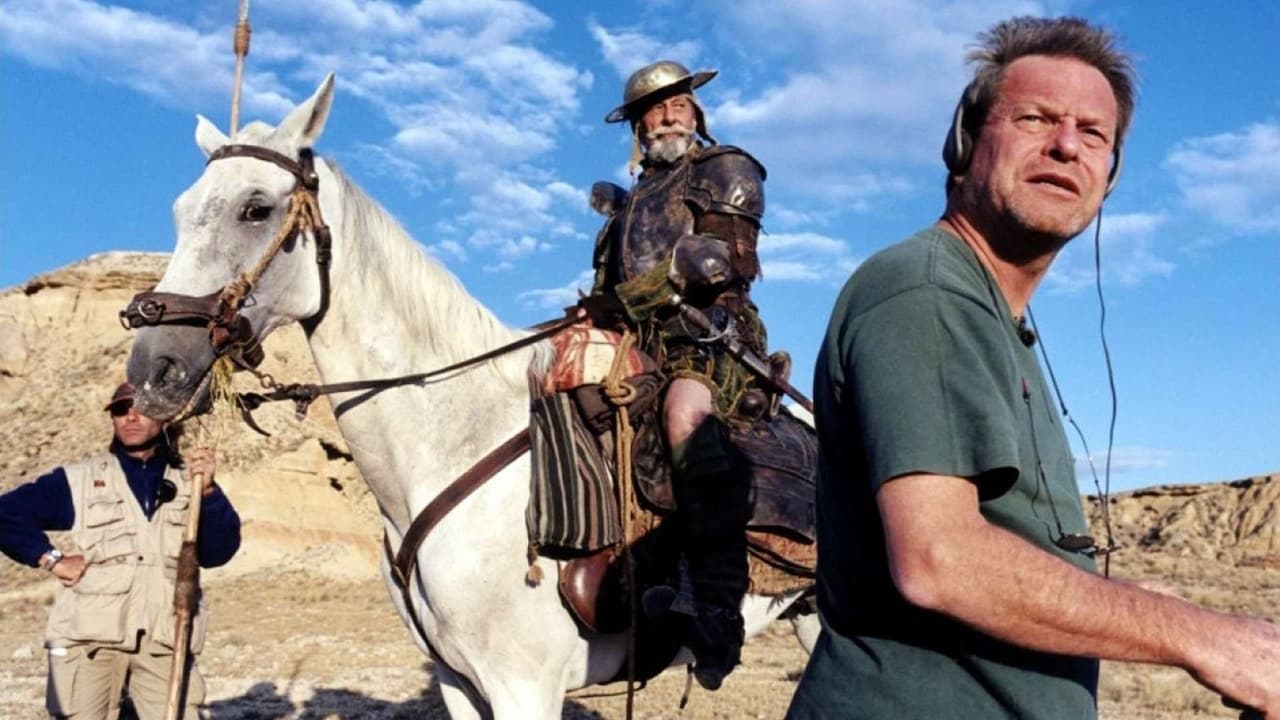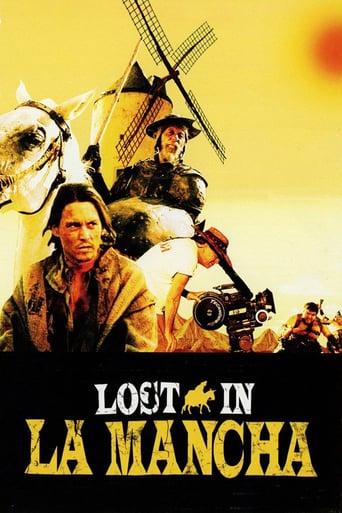



Wonderful character development!
Although it has its amusing moments, in eneral the plot does not convince.
View MoreThe movie really just wants to entertain people.
The plot isn't so bad, but the pace of storytelling is too slow which makes people bored. Certain moments are so obvious and unnecessary for the main plot. I would've fast-forwarded those moments if it was an online streaming. The ending looks like implying a sequel, not sure if this movie will get one
View MoreTerry Gilliam has a bittersweet experience with Hollywood. Forever given a relative meagre budget that does not do justice with his visual ambitions and always having to compromise in his storytelling.Lost in La Mancha was intended to be a big budget European funded film that would be an updated adaptation of the Don Quixote story. Watching Gilliam here, it strikes you that he looks like a thinner version of Orson Welles, a filmmaker who himself had problems making his own version of the story some decades ago.Gilliam got veteran French actor Jean Rochefort for the central role, he spent months learning English and he could ride a horse but he also suffered from ill health just as soon as filming began. To attract the younger crowd and guarantee funding, Johnny Depp also agreed to appear in this film but his shooting was restricted because the extras had not gone through rehearsals.This documentary about the making of the aborted film is all that survives of 'The Man Who Killed Don Quixote.' A cursed production hit by foul weather in the Spanish desert and then the illness of the star. The allocated budget had little margin for error and they were behind after the first week of filming.At one point Gilliam is called Captain Chaos, but he just solemnly looks out to the horizon as he figures how to deal with the latest calamity. Even the studios hired in Madrid is just a warehouse with bad acoustics.The documentary is a study of how films are made and how disaster can easily strike. Yet one cannot help feeling, especially as we see the scenes with the 'giants' which Gilliam thinks is fantastic that maybe he himself got a lucky escape from a film that was likely to get a critical mauling.
View MoreDirector Terry Gilliam tries to film the classic "Don Quixote de la Mancha" as his "The Man Who Killed Don Quixote". He struggles with financing and moves from Hollywood to Europe. It's a big production but the budget is scaled back from $40 to $32 million. Jean Rochefort is playing Don Quixote joined by Johnny Depp and Vanessa Paradis. As the production gets going, problems mount and the filming process sputters. This is basically a behind-the-scenes featurette that would be included in the DVD if the movie actually was made. Except this is much better. It's not all sunshine and roses. It shows the struggles and tribulations of a real visionary under the stress of the real world. The material is not quite as epic as "Hearts of Darkness: A Filmmaker's Apocalypse" but it's still quite compelling.
View More* Contains Spoilers * Terry Gilliam is my second favorite director next to Steven Spielberg. And the film is a wake-up call. It shows the viewers that films are expensive and that filmmakers often have to deal with insurance salesmen and a crew which may or may not be competent. I myself had dreams of becoming a filmmaker when I was a teenager, and this film is helping me to be scared from taking that path. The film demonstrates how filmmakers have to consider the health of the cast and the locations they shoot the film in. One must always take weather and prospective noises into consideration before shooting a film. Practicability and feasibility must also be considered, especially if the filmmakers are dealing with foreigners.Not as funny as I thought it would be, but nevertheless entertaining.8/10
View More"The Man who Killed Don Quixote" was to have been visionary director Terry Gilliam's latest film. With his usual imaginative flair, a story with Gillian's typical sense of humour and a starry cast that will attract the target audience for Gillian's unique film. Despite the usual challenges with making such a film on a budget without losing the ability to produce the sets, costumes and such needed to make the vision reality, things get off to a good start in preproduction. However, the difficulties of getting all the actors in during this stage are only the start of the problems that go on to include military aircraft, Rochefort's back pain, torrential storms. Two directors, employed to film a "behind the scenes" for the DVD suddenly found themselves with a "making of" about a film that was never made.As the comments of Alan Mount have already shown, only an idiot would take this film as an attack on Gilliam personally either on his style, his vision or his abilities as a director. Instead it is an interesting look at the process of taking a vision onto film, followed by a look at the collapse of the production that shows what a fragile beast that a film production is in this case brushing off a rainstorm as a week lost but eventually brought to a close by the back pain of one actor. In regards both aspects, the film is interesting even if it is unlikely to grip the casual multiplex viewer who doesn't are how the films are made. The publicity for this film suggested that the whole thing was a mess and that the events that stopped the film were amazing, but in reality it is the loss of one actor that is the problem, although there are other issues too. As someone interested in cinema, this is still enough for me to justify watching because of what it does well, but, like I said, some viewers might think that this is not a subject worth their time.Gilliam comes off pretty well in my opinion nothing is really his fault and the only thing that could be levelled at him would be that he knows what he wants although this is something that nobody minds when he pulls off things like Time Bandits, 12 Monkeys and such. Actually, none of the cast and crew are to blame and really it is just one of those things. For that reason this will probably appeal mostly to those involved in making films because it is a good look at how little things can go wrong. It is interesting and funny in turns and generally it is worth seeing because it is a rather unique documentary, I know I have not seen any other "making of" films where the subject film was never actually made.Overall, an enjoyable documentary but one that may have a limited audience due to the nature of the material and problems covered. The cast and crew come off looking good and the film does manage to make the limited footage of Don Quixote look like a film that would have appealed to Gilliam's fans; meanwhile this film provides a hint at what might happen while also showing us the nuts and bolts of pre-production as well as how basically filmmakers can expect things to go wrong from day one.
View More